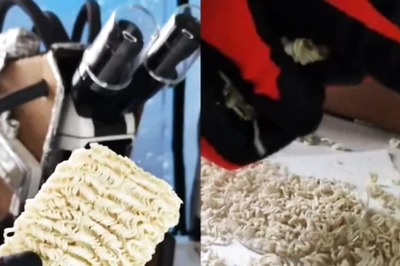
views
Bhopal: It has been 35 years since one of the world's worst gas industrial disasters in Bhopal claimed thousands of lives. The gas tragedy occurred when around 40 tonnes of Methyl Isocyanate (MIC) leaked out of Union Carbide plant, a US multinational corporation which produced fertilisers in Bhopal, on the intervening night of December 2 and 3 in 1984.
The poisonous gas soon reached nearby areas engulfing thousands within minutes. While the official records state 3,787 fatalities in the incident, survivors of the incident claim the figure could be well beyond 25,000.
Around 5.5 lakh people suffered irreparable damages to their bodies.
Awaiting justice after three-and-a-half decades of pain and agony, what the survivors are seeking today is not very different from what they have been demanding right after the disaster which put the city on the global map.
Various organisations fighting for gas leak survivors, namely, Bhopal Gas Peedit Mahila Stationery Karmchari Sangh, Bhopal Gas Peedit Mahila Purush Sangharsh Morcha, Bhopal Group for Information and Action, Bhopal Group for Action and Information and Children Against Dow-Carbide, have been demanding proper medical care and adequate compensation. On Tuesday they put forward a number of demands for the victims. They are as follows:
Compensation: Dow Chemical (current owner of Union Carbid) must pay a minimum of eight thousand US dollars to each survivor as additional compensation for the personal injuries as claimed in the Supreme Court. The Indian government must make Union Carbide/Dow Chemical pay compensation for the health and environmental damage caused by contamination of soil and groundwater.
Criminal Punishment: The US government must serve the summons from the Bhopal District Court upon Dow Chemical without delay. The Indian government must ensure that the criminal trial of accused Indian corporate executives is concluded within the next six months.
Healthcare and Research: The Indian government must ensure that standardised treatment protocols are developed for gas exposure related chronic diseases. It must also establish a population-based registry for all deaths, births and congenital malformations in the gas exposed families. The Indian government must ensure that NIREH (National Institute for Research on Environmental Health) fulfils its commitment to the survivors by generating scientific information on the long-term health damage by the gas disaster and most effective means of ameliorating them. The Madhya Pradesh government must ensure that free medical care is available to residents who drank contaminated groundwater for six months or more.
Rehabilitation: The central and state governments must ensure that a monthly pension of Rs 3,000 is paid to all women widowed by the disaster and those left without means to support themselves as a consequence of gas exposure.
Clean-up: The central government must ensure comprehensive scientific assessment of the depth, spread and nature of soil and groundwater contamination in an around the abandoned pesticide factory. Union Carbide/Dow Chemical must pay for the clean-up of the soil and groundwater up to international standards. The state government must cease and desist from covering up the contamination by building a memorial to the disaster on top of the contaminated lands.
The Suffering Continues
Over 17 thousand people have died in the years following the disaster. Over 1,50,000 people continue to battle chronic diseases caused due to the toxic exposure.
A majority of the affected population could not continue with their usual occupation and tens of thousands of families remain undernourished and hungry.
Rates of cancers, tuberculosis and fatal diseases of the kidneys continue to be much higher among the gas-affected population compared to national rate. Tens of thousands of children of gas exposed parents are born with physical growth and mental development disorders and birth defects, at much higher rates compared to a control population.
Ninety-three per cent survivors of the disaster received only 500 dollars as compensation for personal injuries and families of the dead received 2,000 dollars for each death.
Environmental Mess
Unconnected to the gas disaster and as a consequence of Union Carbide’s unsafe disposal of poisonous wastes within the factory compound from 1969, pumping hazardous waste into wrongly designed ponds from 1977 and reckless dumping of the ponds’ toxic sludge outside the factory in 1996 there is an ongoing environmental disaster in the city due to contamination of groundwater.
As per records of the Supreme Court, close to 100 thousand residents of 48 communities within 5 km of the factory are currently affected by the contamination of groundwater. Groundwater analysis conducted by official scientific agencies have reported the presence of toxic chemicals, pesticides and heavy metals that are known to accumulate in the bodies of exposed persons and cause damage to the brain, lungs, liver, kidneys and genetic material.
“In the last 35 years, the US government has sheltered the fugitives from the criminal case on the disaster and refused to pay heed to the concerns of the survivors. The US government continues to violate the Mutual Legal Assistance Treaty with India and is protecting Dow Chemical from being summoned before the Bhopal district court. International organisations such as the UN and WHO, that rush to help in cases of natural disasters, have hardly moved a finger in the case of the ongoing man-made disaster in Bhopal,” said Rachna Dhingra of BGIA.
Dhingra alleged that irrespective of the political party in power there has been an unbroken and close nexus between the Indian government and the culprit corporations in the last 35 years. Successive Prime Ministers have justified official leniency towards Union Carbide on grounds that such a policy was necessary to ensure continued investment of US capital in India.
(The data has been accessed from the survivor organisations)

















Comments
0 comment